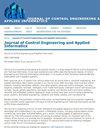A Precise and Adaptive Graph Regularized Low Rank Representation Model for Recognizing Oil-bearing
IF 0.6
4区 计算机科学
Q4 AUTOMATION & CONTROL SYSTEMS
引用次数: 0
Abstract
The recognition of oil-bearing formation is an important part in oil exploration, and recognition technology influences the predictive accuracy and efficiency. Low rank representation (LRR) has aroused much attention in the field of data mining. As a modified version, the low rank representation with adaptive graph regularization (LRR-AGR) exploits the global and local information of data for graph learning, and it simultaneously integrates distance regularization term, non-negative constraint and a rank constraint into the framework of LRR. However, how to balance these regularization terms according to the data greatly limits its clustering performance. To adaptively balance these regularization terms according to data and further improve the clustering performance, we propose a novel model named low-rank representation with adaptive parameters and graph regularization (LRR-APGR) in this paper. Firstly, a novel parameter optimization model is formulated and designed based on the framework of LRR-AGR and the feedback mechanism. Secondly, two global intelligent optimization algorithms, which can effectively solve the parameter optimization problem are presented based on particle swarm optimization (PSO) in multi-dimensional continuous space. Experimental results on the data oilsk81, oilsk83 and oilsk85 wells of Jianghan oil fields in China show that the proposed method can significantly improve the clustering performance and the predictive accuracy. DOI: 10.61416/ceai.v25i3.8650一种精确自适应的图正则化低秩表示含油识别模型
含油地层识别是石油勘探的重要组成部分,而识别技术影响着预测的准确性和效率。低秩表示(LRR)在数据挖掘领域引起了广泛关注。低秩表示与自适应图正则化(LRR- agr)作为一种改进版本,利用数据的全局和局部信息进行图学习,同时将距离正则化项、非负约束和秩约束集成到LRR框架中。然而,如何根据数据平衡这些正则化项,极大地限制了它的聚类性能。为了根据数据自适应平衡这些正则化项,进一步提高聚类性能,本文提出了一种具有自适应参数和图正则化的低秩表示模型(LRR-APGR)。首先,基于LRR-AGR框架和反馈机制,建立并设计了一种新的参数优化模型;其次,提出了两种基于粒子群算法(PSO)的全局智能优化算法,可有效解决多维连续空间中参数优化问题;在中国江汉油田oilsk81、oilsk83和oilsk85井数据上的实验结果表明,该方法可以显著提高聚类性能和预测精度。DOI: 10.61416 / ceai.v25i3.8650
本文章由计算机程序翻译,如有差异,请以英文原文为准。
求助全文
约1分钟内获得全文
求助全文
来源期刊
CiteScore
1.50
自引率
22.20%
发文量
0
审稿时长
6 months
期刊介绍:
The Journal is promoting theoretical and practical results in a large research field of Control Engineering and Technical Informatics. It has been published since 1999 under the Romanian Society of Control Engineering and Technical Informatics coordination, in its quality of IFAC Romanian National Member Organization and it appears quarterly.
Each issue has up to 12 papers from various areas such as control theory, computer engineering, and applied informatics. Basic topics included in our Journal since 1999 have been time-invariant control systems, including robustness, stability, time delay aspects; advanced control strategies, including adaptive, predictive, nonlinear, intelligent, multi-model techniques; intelligent control techniques such as fuzzy, neural, genetic algorithms, and expert systems; and discrete event and hybrid systems, networks and embedded systems. Application areas covered have been environmental engineering, power systems, biomedical engineering, industrial and mobile robotics, and manufacturing.

 求助内容:
求助内容: 应助结果提醒方式:
应助结果提醒方式:


